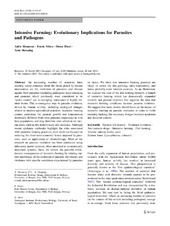| dc.contributor.author | Mennerat, Adèle | eng |
| dc.contributor.author | Nilsen, Frank | eng |
| dc.contributor.author | Ebert, Dieter | eng |
| dc.contributor.author | Skorping, Arne | eng |
| dc.date.accessioned | 2011-03-03T09:41:27Z | |
| dc.date.available | 2011-03-03T09:41:27Z | |
| dc.date.issued | 2010 | eng |
| dc.Published | Evolutionary Biology 37: 59-67 | en_US |
| dc.identifier.uri | https://hdl.handle.net/1956/4545 | |
| dc.description.abstract | An increasing number of scientists have recently raised concerns about the threat posed by human intervention on the evolution of parasites and disease agents. New parasites (including pathogens) keep emerging and parasites which previously were considered to be ‘under control’ are re-emerging, sometimes in highly virulent forms. This re-emergence may be parasite evolution, driven by human activity, including ecological changes related to modern agricultural practices. Intensive farming creates conditions for parasite growth and transmission drastically different from what parasites experience in wild host populations and may therefore alter selection on various traits, such as life-history traits and virulence. Although recent epidemic outbreaks highlight the risks associated with intensive farming practices, most work has focused on reducing the short-term economic losses imposed by parasites, such as application of chemotherapy. Most of the research on parasite evolution has been conducted using laboratory model systems, often unrelated to economically important systems. Here, we review the possible evolutionary consequences of intensive farming by relating current knowledge of the evolution of parasite life-history and virulence with specific conditions experienced by parasites on farms. We show that intensive farming practices are likely to select for fast-growing, early-transmitted, and hence probably more virulent parasites. As an illustration, we consider the case of the fish farming industry, a branch of intensive farming which has dramatically expanded recently and present evidence that supports the idea that intensive farming conditions increase parasite virulence. We suggest that more studies should focus on the impact of intensive farming on parasite evolution in order to build currently lacking, but necessary bridges between academia and decision-makers. | en_US |
| dc.language.iso | eng | eng |
| dc.publisher | Springer | en_US |
| dc.rights | Attribution-NonCommercial CC BY-NC | eng |
| dc.rights.uri | http://creativecommons.org/licenses/by-nc/2.5/ | eng |
| dc.subject | Parasite life-history | eng |
| dc.subject | Virulence evolution | eng |
| dc.subject | Anti-parasite drugs | eng |
| dc.subject | Intensive farming | eng |
| dc.subject | Fish farming | eng |
| dc.subject | Atlantic salmon | eng |
| dc.subject | Salmon louse Lepeophteirus salmonis | eng |
| dc.subject | Salmo Salar | eng |
| dc.title | Intensive Farming: Evolutionary Implications for Parasites and Pathogens | en_US |
| dc.type | Peer reviewed | |
| dc.type | Journal article | |
| dc.description.version | publishedVersion | en_US |
| dc.rights.holder | The Author(s) 2010 | en_US |
| dc.rights.holder | Copyright The Author(s) 2010. This article is published with open access at Springerlink.com | en_US |
| dc.identifier.doi | https://doi.org/10.1007/s11692-010-9089-0 | |
| dc.subject.nsi | VDP::Mathematics and natural science: 400 | en_US |

